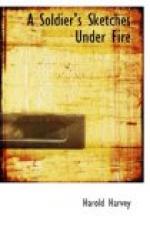[Illustration: “Hammersmith bridge.”]
It was the biggest, roomiest, and most palatial dug-out we had. The top was just a small roof-garden, carefully planted and laid out. It had statuary, too, in groups. The statues were fashioned in clay by amateur hands, and the artistic effects were original and novel, to say the least. It was also the safest place, this “Lounge,” because it was sunk four feet below the level of the trench itself. It accommodated twelve easily. Impromptu concerts were frequent here; our far-famed mouth-organ band performed at such intervals as our own military duties and the enemy’s cascades of shells permitted. It was here the names of neighbouring streams and nullahs were chosen from which we drew our daily beverage of “Adam’s Ale” (untaxed, and rather thick), such as the portentous “Caesar’s Well.” In another spacious dug-out we had our “Times Book Club.” This “eligible tenement” had the special distinction of a stove and chimney (purloined from a ruined farm)—that is, it had a chimney till the enemy spotted and so riddled it that it collapsed. It had a glass window (fixed in clay), statuary (modelled in clay), decorations (log-cabin order), one chair (also purloined, back broken off), one table (very treacherous); and I mustn’t forget the president’s bell (tobacco tin shell, and a cartridge for a clapper). It was lit by many candles, and as the fee for membership was a book or magazine from home, it served a good purpose.
“Dirty Dick’s”.
[Illustration: “Dirty Dick’s".]
After a time the sing-songs in a trench some little distance away from “Leicester Lounge” knocked spots off all the others anywhere, thanks to the acquisition of a piano for them—probably the only instrument of its kind which has ever been in the British trenches at the front. It came from “Dirty Dick’s.” The picture of “Dirty Dick’s” gives a rough idea of the devastation of war. The portion of a building to the right was all that remained of what, but a few weeks before, had been a handsome and prosperous hotel, and the wall with window and door spaces left, shown to the left, had been the residence of a prominent citizen. All that was left of the hotel was a shaky wall, though the sign-board remained, having escaped the enemy’s fire.
We were placed in the trench shown in the foreground, and the Germans were also entrenched in the space seen in the distance between the ruins. When we first took up our position the hotel was intact except that the roof had been destroyed. The wall towards our trench was standing, and when it fell the bricks came tumbling over us, and the dust of the red masonry turned us into copper-coloured men. But prior to this three “Jocks” and three of our own regiment crawled out of the trench and into the house, and we spotted a piano on the ground floor. The temptation was too great; we decided to remove it. The operation took us two and a half hours’ hard struggle. Eventually we got the instrument into our trench, somewhat battered about and minus one leg, but still answering to the keyboard. Unfortunately two of the party were wounded in doing this, but they didn’t mind. Night after night we had sing-songs accompanied on the piano in proper style, and used to give forth with the full strength of our lungs—




